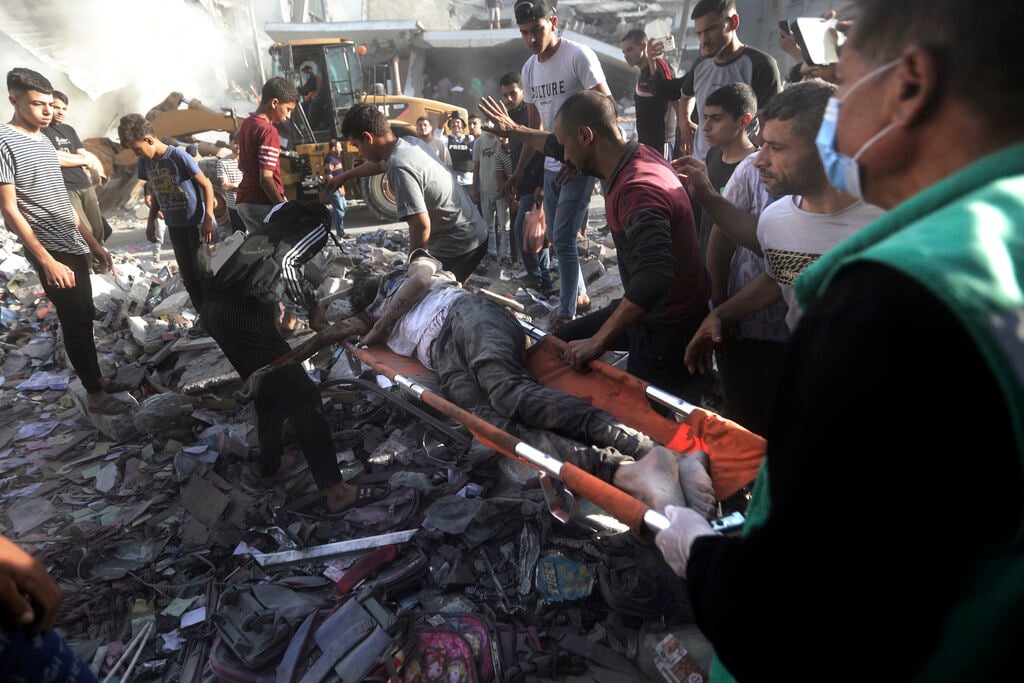From apartheid assault to unsettled sanctuary: Gaza citizens’ desperate exodus amidst Israel’s onslaught causing 10,000 Palestinian deaths

A charity worker was forced to leave her home in northern Gaza along with her elderly mother after the brutal bombardment of Palestine by apartheid Israel that began post-October 7. Reda Sahoiun and her mother jumped into a taxi, taking with them only a ring, two necklaces, bracelets, blankets and some painkillers, as they fled the chaos and carnage to look for refuge at a friend’s house in Khan Younis, a city in southern Gaza. They found it was equally unsafe.
“It was not safe at all there. They bombed the house next to ours without warning.”
The Israeli military’s fierce bombing campaign, aimed at annihilating Hamas, has resulted in over 10,000 Palestinian deaths, and committing war crimes in the process.
Among the victims, at least 4,000 are children, many of whom remain buried under the collapsed building debris. Mass graves are being used for burial while children are reaching hospitals with their names scrawled on their arms for identification. The death toll, though not independently verified, does not distinguish between civilians and active members of Hamas.
In the aftermath of US Secretary of State Antony Blinken’s Middle East trip, US officials expressed their concern over the severity of Israel’s counterattack against Hamas and the high number of civilian casualties. This war has impacted the ordinary citizens of the Hamas-run territory, who have described Gaza as a place big enough to trap them yet small enough that moving across its length without transportation is challenging.
Since the Israeli military advanced west with tank shelling and airstrikes, escaping the bombings has become increasingly risky. An agreement mediated by Qatar and the US allowed foreign passport holders to start leaving through the Rafah border crossing, but this has stalled in recent days.
Israeli war crimes
The situation has paused life in Gaza, affecting schools, businesses, and movement. The conflict has also halted the accurate flow of information. The Israeli government remains in shock over the October 7 deaths and is bewildered at the world’s apparent ease in shifting focus to the suffering in Gaza.
The current conflict has resulted in the death of 79 employees of UNRWA, the UN agency managing Palestinian refugees. Despite the ongoing violence, life continues with the United Nations Population Fund estimating that 50,000 pregnant women are caught in the conflict, with over a tenth due to give birth within a month.
The war has also drastically impacted the availability of clean drinking water and power. The average daily water allocation in Gaza is just three litres, according to the World Health Organization (WHO). The war has disrupted the water supply system, and residents are having to reuse contaminated wells.
Amidst this chaos, US envoy Blinken stated that efforts must be taken to protect Palestinian civilians. Meanwhile, Gilad Erdan, Israel’s ambassador to the UN, denied the existence of a humanitarian crisis and the need for a humanitarian pause to the conflict with Hamas.
Hospitals in Gaza, presumed relatively safe, are now home to many of the internally displaced people. However, Israel’s army accuses Hamas of systematically using hospitals to hide its military activities. The situation continues to worsen every day, with resources rapidly depleting.

Follow more of The Thaiger’s latest stories on our new Facebook page HERE.
Latest Thailand News
Follow The Thaiger on Google News:


























